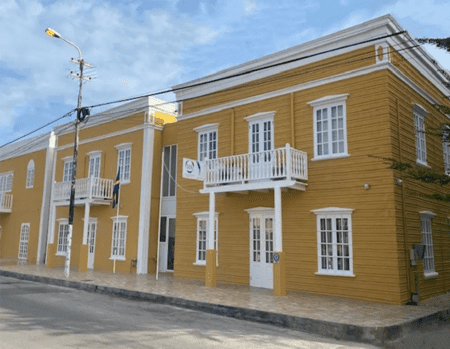The Future of Work in Curaçao 2019
INTRODUCTION
is organized by the Social Economic Council (SER) of Curaçao, the SER of Aruba and the SER of Sint Maarten.
Date : 9-10 May 2019
Location: Avila Beach Hotel, Curaçao
The aim of the symposium is to explore, together with stakeholders, policy options with respect to the question ‘how to optimize the benefits and minimize the costs of labor migration in relation to sustainable socioeconomic development of the three countries?’
Participants of the symposium will be policy makers and implementing staff from different ministries from the three countries, representatives from employers’ and employees’ organizations, members of the Social-Economic Councils (SER) of the three countries, NGOs, politicians, universities, and migrants.
During the symposium four major topics will be addressed:
- Migration and sustainable socioeconomic development: (global and regional) evidence-based findings on the relationship between migration and sustainable socio-economic development. How to optimize the benefits and minimize the costs?
- Opportunities and challenges of migration (management): myths and misconceptions; controversies, the liberal paradox; changing the narrative.
- (Global) Trends in labor migration policies and refugee policies: lessons learned on effectiveness of policies & best practices. Caribbean perspective on effective migration policies. How can we best govern migration to enhance socioeconomic development?
- Keynote speakers – among others – from the International Organization for Migration (IOM), the Migration Policy Institute (MPI), Caribbean Migration Consultations (CMC), UNHCR, the Canadian Embassy in Bogota, the University of Curaçao, the University of Sint Maarten and the Think To DO Institute will give presentations on the aforementioned topics, on day 1 and day 2.
Each plenary session will be followed either by a Q&A session or a panel discussion.
On day 2 there will be five parallel breakout sessions, with the following themes:
- Reaping the benefits and minimizing the cost of migration.
- Migration is a tool to safeguard the socioeconomic model of the ACS-countries: migration approaches revisited.
- Brain drain and brain gain: a matter of reversing the coin?
- Changing the narrative on migrants.
- Informal and formal labor market approaches: towards win-win- approaches.
During the parallel breakout sessions the (20-25) participants will explore and deepen the themes and discuss the policy priorities and possible building blocks for those policies. The themes will be introduced shortly by local and international experts after which a discussion will be moderated. The outcome of the breakout sessions will be shared with the other participants in a plenary roundup session.
A final panel discussion will take place on major findings and policy recommendations.
For more information on the symposium – program, plenary and breakout sessions, speakers click here – or go to the websites of SER Aruba, SER Curaçao, and SER Sint Maarten ( www.ser.aw / www.ser.cw / www.sersxm.org ).
The symposium is for invited guests only.
Migration Symposium 9 & 10 May 2019 on Curaçao
Migration and Socioeconomic Development
Policy challenges and options
Organized by the Social Economic Councils of Aruba, Curaçao and Sint Maarten (ACS)
Day 1: 9 May 2019
Master of Ceremonies: Nephtalie Demei
MORNING PROGRAM
8.30 Registration (till 9.15)
9.25 Protocol
9.30 Welcome
John Jacobs, acting president of the SER Curaçao
9.35 Opening
Prime Minister of Curaçao, honourable Eugene Rhuggenaath
Video message by Prime Minister of Aruba, honourable Evelyna Wever-Croes
Video message by Prime Minister of Sint Maarten, honourable Leona Marlin-Rome
9.50 Opinions on the move
10.00 Migration and sustainable socioeconomic development
Michela Macchiavello (International Organization for Migration, IOM)
Advantages and challenges of Labor Migration: trends and best practice
Gerardo Gonzalez (Centre of Public Policies IESA, Caracas)
Las islas útiles: Causes and Opportunities of the Venezuelan Migration to the ABC Islands and St Maarten
10.25 Q&A
10.40 Population dynamics & migration policies Aruba, Curaçao and Sint Maarten, part 1
Presentations Aruba and Sint Maarten: facts and figures on population
11.00 Coffee/tea break
11.15 Population dynamics & migration policies Aruba, Curaçao and Sint Maarten, part 2
Presentation Curaçao: Building a life, building a nation. Fact and Faces of regional migration to Curaçao.
Prof. dr. Flora Goudappel (University of Curaçao)
Labor Migration: Legal and policy frameworks
11.40 Challenges of and options for current labor migration policy on Aruba
Edwin Jacobs (Social Insurance Bank of Aruba)
Without migration there is no future
12.00 Vision on labor migration policy Aruba
Ronald van Trigt (Aruba Trade & Industry Association – ATIA)
Migration in Aruba: the past and the future
12.20 Vision on labor migration policy Curaçao
From the perspective of labor migrants: Jamaica and Venezuela
12.40 Lunch
AFTERNOON PROGRAM
13.45 Opportunities and challenges of migration: Myths and misconceptions, controversies, the liberal paradox and changing the narrative
Dr. Bonnie Benesh (Think To Do Institute)
Push or Pull, Open or Close? The Liberal Paradox of Migration
Dr. Rose-Mary Allen (University of Curaçao)
Framing and reframing of immigrants in the Dutch Caribbean islands
Charles do Rego (National Archaeological Anthropological Memory Management)
Labor migration, diverging paths and development challenges in historic perspective
Prof. dr. Antonio Carmona Báez (University of Sint Maarten)
Migration, Borders and Higher Education for Development: Considerations for the Dutch Caribbean
14.30 Q&A
14.45 Coffee/tea break
15.00 Trends in labor migration and labor-related refugee policies: Effectiveness of policies & best practices
Kate Hooper (Migration Policy Institute Washington)
Designing selection systems that can respond to labor market needs
Prof. dr. Jan Rath (University of Amsterdam)
Promoting Migrant Entrepreneurship
Michael Watts (Canadian Embassy Bogota)
Canadian Economic Immigration Policies and Programs
Kelly Bendelow (UNHCR, Aruba)
Protection-sensitive migration: Understanding outflows from Venezuela
16.00 Panel discussion based on statements on topics of the day Panel leader: Guido Rojer
16.55 Closure
Day 2: May 10
Master of Ceremonies: Nephtalie Demei
MORNING PROGRAM
8.00 Registration
8.45 Caribbean perspective on effective migration policies: How can we best govern migration to enhance socioeconomic development?
Panel presentations
Panel leader: Deva-Dee Siliee
Michela Macchiavello (IOM)
Overview of Labor Migration in the Caribbean: Challenges and Opportunities
Dr. Bonnie Benesh (Think To Do Institute)
Caribbean Perspective on Effective Migration policy as a Pathway to Resilience
Guido Rojer (University of Curaçao)
Best practices on migration policy in the Caribbean
Gerardo Gonzalez (Centre of Public Policies IESA, Caracas)
Experiences in Migration Policies for Venezuelans in Latin America and the Caribbean
Brendan Tarnay (Caribbean Migration Consultations)
Migration Governance in the Caribbean – The Caribbean Migration Consultations and other Regional Initiatives.
10.25 Coffee/tea break
10.45 5 parallel breakout sessions Migration policies and sustainable development, part 1
- Reaping the benefits and minimizing the cost of migration
Migration is an aspect of development itself and brings significant and long-lasting benefits. What are socioeconomic advantages of immigration? For example: meeting labor demands, cultural diversity, innovations, tax incomes. But immigration comes also with challenges for individuals, communities and institutions. For example: fear for displacement of local labor, fear for less social cohesion and cultural identity. What kind of policies are needed to address these challenges? And to maximize the benefits? The Caribbean perspective.
- Migration is a tool to safeguard the socioeconomic model of the ACS-countries: migration approaches revisited.
What are rationales for modernization of migration policies (such as meeting labor demands, as a tool to safeguard employment opportunities for local employees, driver of innovation, other economic factors as drivers, demographic trends, etc.)? What are the challenges of the current migration policies? Should the ACS-countries design juridical and fiscal measures to make the ACS more attractive for labor migrants or not? If yes, how? Should the countries be more selective, for example by attracting (temporarily) high productive labor migrants?
- Brain drain and brain gain: a matter of reversing the coin?
Brain drain and brain gain are characteristics of the same economy. What are disadvantages and advantages of a brain-drain? Measures to prevent brain-drain / bring back diaspora and/or profit from diaspora? One of the factors concern moderate socioeconomic perspectives in the ACS-countries versus positive socioeconomic perspectives elsewhere. This means that push and pull factors work simultaneously, causing net negative migration and a (risk of) decreasing population and in particular (the risk of) a decreasing labor population. At the same time relative welfare levels, especially in the region, make that the ACS islands attract labor migration from the region. What are the advantages and disadvantages? What are means and ways to address this situation? Could for example the management of inter-island labor migration be a viable response: what is the rationale? What other measures are needed?
- Changing the narrative on migrants.
What are popular misconceptions about migrants? How to counter these misconceptions? How to deal with the liberal paradox? Integration of (irregular) migrants: what is the rationale? Is policy needed? Why? Or do migrants integrate themselves? If so, under what kind of policy frameworks?
- Informal and formal labor market approaches: towards win-win- approaches.
Mismatches on the labor market (quantitatively and qualitatively) lead on the one hand to emigration (of higher educated and high productive persons) and on the other hand to immigration (of lower-educated persons in lower productive sectors, such as the hospitality sector). What short-term policies do we need and what mid-term policies? Simultaneously, informal labor markets seem to be expanding rapidly, providing labor to a growing number of irregular and regular migrants, and local workforce. Effects of irregular (labor) migrations: socioeconomic, fiscal, social security system. How to improve responses to influx of irregular migrants? For example: temporary special regularization to enable applications for short-term residence and work permits for those who have passed the screening (no criminal record, no communicable diseases)? What are advantages and disadvantages of such and other measures? What short-term do we need and what mid-term policies?
12.00 Lunch
AFTERNOON PROGRAM
13.00 5 parallel breakout sessions Migration policies and sustainable development, part 2
Policy priorities
14.05 Plenary: video message, Sigrid Kaag, Minister for Foreign Trade and Development Cooperation, The Netherlands
14.15 Presentation outcome of breakout sessions
14.40 Coffee/tea break
15.00 Panel discussion: major findings and policy recommendations Panel leader: Deva-Dee Siliee
16.15 Opinions on the move
16.25 Closing remarks
16.30 Farewell drink & Social Networking
Mas informashon

Konseho Sosial-Ekonómiko
Ansinghstraat #17
Curacao
Tel: +5999 461 5406 / 5328
Email: info@ser.cw
